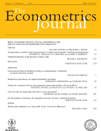
Econometrics Journal
Scope & Guideline
Elevating Economic Discourse with Peer-Reviewed Excellence
Introduction
Aims and Scopes
- Theoretical Econometrics:
Research that develops new econometric theories or improves existing methodologies, enhancing the understanding and application of econometric principles. - Applied Econometrics:
Studies that apply econometric techniques to real-world economic problems, providing empirical evidence to support economic theories or policy evaluations. - Causal Inference:
Research focused on establishing causal relationships through advanced econometric methods, including instrumental variables, treatment effects, and structural models. - Bayesian Econometrics:
Papers that utilize Bayesian methods for estimation and inference, contributing to the growing field of Bayesian econometrics and its applications. - High-Dimensional Data Analysis:
Research addressing the challenges of working with high-dimensional datasets, including variable selection, regularization techniques, and machine learning approaches. - Dynamic Models and Time Series Analysis:
Studies that investigate dynamic relationships in time series data, including GARCH models, VAR models, and structural time series analysis.
Trending and Emerging
- Machine Learning in Econometrics:
There is a noticeable increase in research that integrates machine learning techniques into econometric analysis, enhancing predictive accuracy and model flexibility. - Causal Machine Learning:
Emerging studies are focusing on causal inference using machine learning methods, highlighting the importance of understanding causal relationships in economic data. - Policy Evaluation and Treatment Effects:
Research centered on evaluating the impacts of policies and interventions through advanced econometric techniques is gaining traction, particularly in light of recent global events such as the COVID-19 pandemic. - Network Econometrics:
An increasing interest in econometric models that account for network structures and dependencies among economic agents reflects a growing recognition of interconnectedness in economic systems. - Nonparametric and Semiparametric Methods:
There is a rising trend in the application of nonparametric and semiparametric approaches, which allow for more flexibility in model specification and better handling of complex data patterns.
Declining or Waning
- Classical Linear Regression Models:
Research focusing on traditional linear regression techniques has become less frequent, as more complex models and methods are increasingly favored for their ability to address real-world complexities. - Simple Estimation Techniques:
Papers that rely on straightforward estimation techniques without incorporating modern advancements or complex methodologies appear to be waning, as there is a growing emphasis on sophisticated econometric approaches. - Descriptive Econometrics:
Studies that primarily describe economic phenomena without rigorous quantitative analysis are becoming less common, with a stronger focus on inferential statistics and causal analysis in recent publications.
Similar Journals
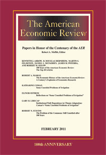
AMERICAN ECONOMIC REVIEW
Where Economic Insights Meet Academic Excellence.AMERICAN ECONOMIC REVIEW, published by the American Economic Association, stands as one of the most prestigious academic journals in the field of Economics and Econometrics. With an impressive impact factor and ranking of #9 out of 716 in its category, this journal has achieved a notable position within the top 2% of journals globally, as evidenced by its Q1 classification in 2023. Covering a broad spectrum of economic theory and applied research, it serves as a primary platform for the dissemination of high-quality scholarly work, contributing significantly to the ongoing dialogue within the discipline. Although Open Access options are not available, the journal's rigorous peer-review process ensures that published articles uphold the highest standards of academic integrity and relevance. With coverage spanning from 1973 to 2024, the AMERICAN ECONOMIC REVIEW continues to be an essential resource for researchers, professionals, and students eager to stay at the forefront of economic thought and innovation.

ECONOMETRICA
Fostering intellectual discourse in econometrics.ECONOMETRICA, published by Wiley, is a leading journal in the field of economics and econometrics, renowned for its rigorous and cutting-edge research contributions. With an ISSN of 0012-9682 and an E-ISSN of 1468-0262, this esteemed journal holds a prestigious position in the academic landscape, classified in the top quartile (Q1) for both Economics and Econometrics as of 2023, and ranked 42 out of 716 in its field, placing it in the 94th percentile according to Scopus metrics. The journal's scope encompasses a diverse range of topics aimed at advancing economic theory and its practical applications, making it an essential resource for scholars, practitioners, and students alike. Although it operates under a subscription model, the depth and quality of research published in ECONOMETRICA underscore its significance as a cornerstone for intellectual discourse and innovation within the field. Based in the United Kingdom, at 111 River St, Hoboken, NJ 07030-5774, ECONOMETRICA continues to attract high-caliber contributions that shape the future of econometric research.
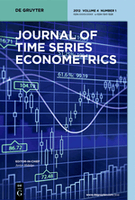
Journal of Time Series Econometrics
Innovating Time Series Methodologies for Economic ExcellenceJournal of Time Series Econometrics, published by WALTER DE GRUYTER GMBH, serves as a pivotal platform for current research within the fields of Economics and Econometrics. With an ISSN of 2194-6507 and E-ISSN 1941-1928, this journal is dedicated to the advancement of time series analysis techniques and their practical application in economic contexts. Operating from Germany, the journal seeks to foster a vibrant intellectual environment, inviting contributions that push the boundaries of established theories and methodologies. With an established influence in academia, recent evaluations have placed the journal within the Q4 category in the 2023 rankings for Economics and Econometrics, alongside a notable 39th percentile ranking in Scopus. Although currently lacking open access options, the journal promotes crucial discussions and knowledge dissemination on innovative econometric practices. The period from 2016 to 2024 marks a significant phase of convergence in the journal's evolution, promising ongoing relevance and engagement for researchers, professionals, and students eager to explore the complexities of time series analysis and its implications within economic theory.
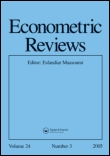
Econometric Reviews
Connecting Theory with Practice in Economic AnalysisEconometric Reviews, published by Taylor & Francis Inc, is a premier journal in the field of Economics and Econometrics, recognized for its significant contributions to the advancement of economic theory and practice since its inception. With its ISSN 0747-4938 and E-ISSN 1532-4168, the journal has maintained a consistent publication record from 1982 to 2024, offering a platform for groundbreaking research that shapes the landscape of quantitative economic analysis. With a proud place in the Q1 category for Economics and Econometrics as of 2023, it stands as a critical resource for scholars, practitioners, and students alike, actively engaging with themes such as econometric methods, theory, and policy implications. Although operating under a subscription model, the journal’s high impact factor reflects its esteem within the academic community, fostering a rich dialogue among researchers in this evolving discipline. The journal’s office is located at 530 Walnut Street, Ste 850, Philadelphia, PA 19106, USA, forging connections in one of the central hubs of economic research.
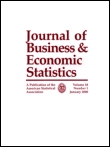
JOURNAL OF BUSINESS & ECONOMIC STATISTICS
Connecting Researchers to the Heart of Economic StatisticsJOURNAL OF BUSINESS & ECONOMIC STATISTICS is a premier academic journal published by Taylor & Francis Inc, dedicated to disseminating high-quality research in the fields of business, economics, and statistics. With an impressive impact in the academic community, the journal maintains a distinguished Q1 ranking across various categories including Economics and Econometrics, Social Sciences (miscellaneous), and Statistics and Probability, showcasing its relevance and influence in contemporary research. Since its inception in 1983, the journal has served as a vital resource for researchers, professionals, and students seeking insights into quantitative methodologies and their application in the economic domain. While the journal is not currently open access, its rigorous peer-review process ensures that published articles are of the highest scholarly standards. Researchers and practitioners alike will find a rich repository of empirical and theoretical studies that foster knowledge advancement in the intersecting realms of business, economics, and statistical analysis.

Central European Journal of Economic Modelling and Econometrics
Enhancing understanding of dynamic economic systems.Central European Journal of Economic Modelling and Econometrics (ISSN: 2080-0886, E-ISSN: 2080-119X) is a premier academic publication housed under the auspices of the Polish Academy of Sciences - Lodz Branch. Since its establishment, this journal has served as a crucial platform for scholars and practitioners alike, focusing on the dynamic realms of economic modeling and econometrics. The journal is dedicated to advancing the understanding of economic systems and statistical methodologies, striving to bridge theoretical approaches with practical applications. Although currently categorized in the Q4 quartile across various fields such as Applied Mathematics, Economics, and Statistics, its commitment to rigorous research and scholarly discourse ensures it remains an important resource for academics looking to contribute insights in these sectors. Published in Poland and featuring articles aimed at enhancing the body of knowledge in econometric modeling, this journal embraces an open-access model, allowing for greater dissemination of research findings to a global audience. Researchers, professionals, and students will find valuable contributions that not only highlight emerging trends but also foster innovation in the field of economic sciences.
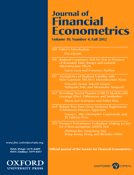
Journal of Financial Econometrics
Bridging theory and practice in financial econometrics.Journal of Financial Econometrics, published by Oxford University Press, stands as a leading academic journal in the fields of financial economics and econometrics. With an impressive impact factor and a ranking in the Q1 quartile for both Economics and Finance categories in 2023, this journal is recognized for its contribution to advancing theoretical and applied methodologies in financial econometric analysis. It publishes high-quality research that addresses critical issues in finance, aiming to foster a deeper understanding of the economic factors influencing financial markets and instruments. Researchers and practitioners alike benefit from its rigorous peer-reviewed articles, which are invaluable resources for both academic scholars and finance professionals. The journal’s content typically spans pioneering techniques in econometric modeling, empirical analysis of financial instruments, and innovative applications of econometric theory in real-world scenarios. Operating out of the United Kingdom, the journal continues to serve as a vital platform for disseminating significant research findings from 2005 to 2024, ensuring that the latest advancements in the field are accessible to its audience.
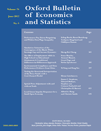
OXFORD BULLETIN OF ECONOMICS AND STATISTICS
Pioneering methodologies in economics and econometrics.The Oxford Bulletin of Economics and Statistics, published by Wiley, stands as a leading journal in the realms of Economics, Econometrics, and Statistics. Since its inception in 1973 and converging through to 2024, the journal has consistently positioned itself in the top quartile (Q1) across multiple categories, including Economics and Econometrics, Social Sciences, and Statistics and Probability, highlighting its influential status in the academic community. With a commendable ranking within Scopus, notably ranked #53 in Social Sciences and #28 in Statistics and Probability, it serves as a critical platform for disseminating rigorous research and innovative methodologies. Researchers, professionals, and students are encouraged to contribute and engage with the high-quality content that defines this esteemed journal, which does not currently offer Open Access but remains a pivotal resource for those seeking to deepen their understanding of economic and statistical paradigms in the pressing global landscape.
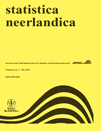
STATISTICA NEERLANDICA
Advancing statistical science through rigorous scholarship.STATISTICA NEERLANDICA is a prestigious peer-reviewed journal published by Wiley, focusing on the fields of statistics and probability. Established in 1946 and addressing key issues in statistical theory and its applications, the journal has significantly contributed to the development of modern statistical practices. With an impressive Q2 categorization in both Statistics and Probability, as well as Statistics, Probability, and Uncertainty, STATISTICA NEERLANDICA stands out within its field, ranking in the 62nd percentile among its peers in mathematics, specifically in statistics and probability. Researchers, professionals, and students can benefit from its rigorous scholarship and innovative methodologies, aiding in the advancement of statistical science. Although the journal does not operate under an open access model, it maintains a commitment to disseminating high-quality research, making it a vital resource for those engaged in statistical inquiry.
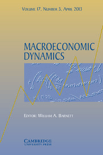
MACROECONOMIC DYNAMICS
Exploring the Forces Shaping Global EconomiesMACROECONOMIC DYNAMICS, a distinguished academic journal published by Cambridge University Press, serves as a pivotal platform for innovative research in the fields of economics and econometrics. With its ISSN 1365-1005 and E-ISSN 1469-8056, the journal has been at the forefront of scholarly communication since its inception in 1997, offering an extensive range of articles that explore dynamic economic models, policy impacts, and theoretical advancements through the latest empirical analyses. Currently holding a Q2 ranking within the 2023 Economics and Econometrics category, and positioned at rank #409 out of 716 within Scopus, it is an essential resource for researchers, professionals, and students alike, looking to stay updated on critical developments in macroeconomic theory and practice. Although it follows a traditional subscription model rather than Open Access, the journal continually strives to disseminate high-quality, peer-reviewed content that informs and inspires the global economics community. The importance of MACROECONOMIC DYNAMICS lies in its commitment to fostering a deeper understanding of economic phenomena, making it a must-read for anyone engaged in the complexities of the economic landscape.